牛津英语模块七unit4知识点
- 格式:doc
- 大小:348.50 KB
- 文档页数:16
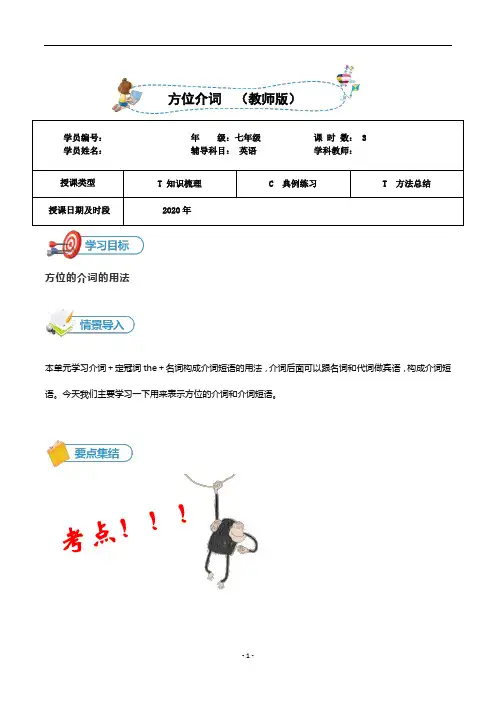
方位介词(教师版)学员编号:年级:七年级课时数: 3学员姓名:辅导科目:英语学科教师:授课类型T 知识梳理 C 典例练习T 方法总结授课日期及时段2020年方位的介词的用法本单元学习介词+定冠词the+名词构成介词短语的用法,介词后面可以跟名词和代词做宾语,构成介词短语。
今天我们主要学习一下用来表示方位的介词和介词短语。
方位的介词的用法:1. on介词on表示“在某物之上”的意思,它通常表示一个物体在另一个物体之表面上面。
两者之间有接触。
例如:Your book is on the desk. 你的书在课桌上面。
2. in介词in表示“在某物的里面”,它通常表示一个物体在另外一个物体的内部、中间或者在某个范围之内。
例如:Your pen is in the pencil case. 你的钢笔在铅笔盒里面。
3. under介词under表示“在某物的下面”,它通常表示一个物体在另外一个物体的垂直正下面,两者之间没有接触。
例如:My bike is under the tree. 我的自行车在树的下面。
The shoes are under the chair. 鞋在椅子的下面。
拓展:under和below 的区别under表示“在……之下”,通常表示位置处于正下方,与介词over“在……上方”相对应。
例如: There is a book under the table. 桌子下面有一本书。
below表示“在……之下”,“在……的下游”,与介词above相对应,常指在某物体之下,但不一定在该物的正下方。
例如:He is below the average at school.他的学习成绩在水准以下。
4. behind介词behind表示“在某物的后面”,它通常表示一个物体在另外一个物体的后面。
例如:Your brother is behind the tree. 你的弟弟在树的后面。
5. next tonext to是由形容词next和介词to构成的介词短语表示“紧挨着、在某物的旁边”的意思。
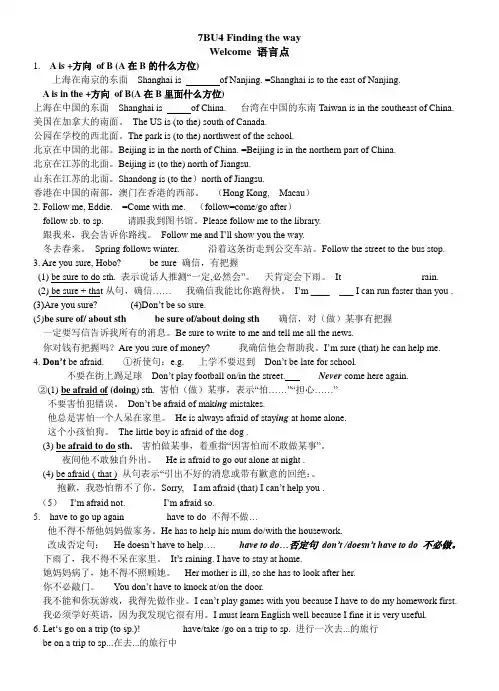
7BU4 Finding the wayWelcome 语言点1. A is +方向of B (A在B的什么方位)上海在南京的东面Shanghai is of Nanjing. =Shanghai is to the east of Nanjing.A is in the +方向of B(A在B里面什么方位)上海在中国的东面Shanghai is of China. 台湾在中国的东南Taiwan is in the southeast of China.美国在加拿大的南面。
The US is (to the) south of Canada.公园在学校的西北面。
The park is (to the) northwest of the school.北京在中国的北部。
Beijing is in the north of China. =Beijing is in the northern part of China.北京在江苏的北面。
Beijing is (to the) north of Jiangsu.山东在江苏的北面。
Shandong is (to the)north of Jiangsu.香港在中国的南部,澳门在香港的西部。
(Hong Kong, Macau)2. Follow me, Eddie. =Come with me. (follow=come/go after)follow sb. to sp. 请跟我到图书馆。
Please follow me to the library.跟我来,我会告诉你路线。
Follow me and I’ll show you the way.冬去春来。
Spring follows winter. 沿着这条街走到公交车站。
Follow the street to the bus stop. 3. Are you sure, Hobo? be sure 确信,有把握(1) be sure to do sth. 表示说话人推测“一定,必然会”。
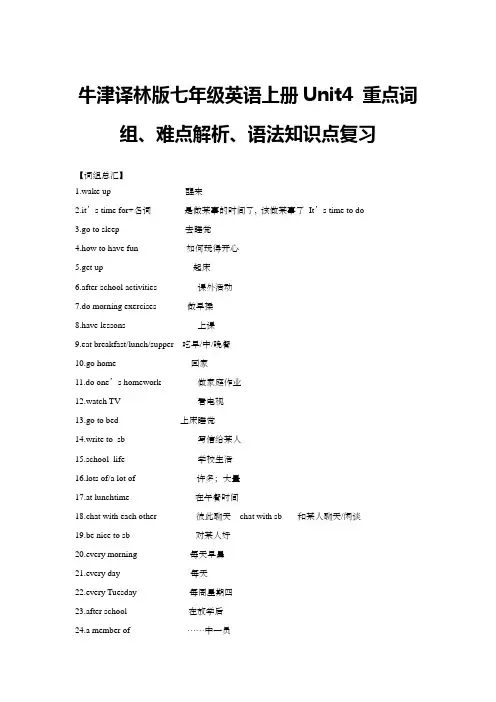
牛津译林版七年级英语上册Unit4 重点词组、难点解析、语法知识点复习【词组总汇】1.wake up 醒来2.it’s time for+名词是做某事的时间了, 该做某事了It’s time to do3.go to sleep 去睡觉4.how to have fun 如何玩得开心5.get up 起床6.after-school activities 课外活动7.do morning exercises 做早操8.have lessons 上课9.eat breakfast/lunch/supper 吃早/中/晚餐10.go home 回家11.do one’s homework 做家庭作业12.watch TV 看电视13.go to bed 上床睡觉14.write to sb 写信给某人15.school life 学校生活16.lots of/a lot of 许多;大量17.at lunchtime 在午餐时间18.chat with each other 彼此聊天chat with sb 和某人聊天/闲谈19.be nice to sb 对某人好20.every morning 每天早晨21.every day 每天22.every Tuesday 每周星期四23.after school 在放学后24.a member of ……中一员25.the Swimming Club 游泳兴趣小组26.have a good time 玩的开心27.email sb 给某人发电子邮件28.play games 玩游戏, 进行比赛29.twice a week 一周两次30.have fun 娱乐,乐趣;开心P.27-3031.listen to the radio 听收音机32.make a model plane 制作模型飞机33.read newspapers 看报read books 看书34.write emails 写邮件35.watch football matches 看球赛36.watch too much TV 看电视太多37.listen to music 听音乐38.listen to the teacher 听老师讲39.walk a dog 遛狗40.a piece of good news 一则好消息41.in the school football team 在学校足球队42.all the time 一直43.know (a lot) about…对……了解(很多)44.read comic books 看连环漫画书45.on the volleyball court 在排球场46.from...to…从……到……47.meet up with sb. 约见某人48.do their homework 做他们的作业49.under a big tree 在大树下50.go to one’s dancing lesson 去上舞蹈课51.have (no) time to do sth. 有(没有)时间做某事52.have a lot of new friends 有许多新朋友53.teach us English 教我们英语54.talk about…谈论关于……55.at home 在家56.say hello to…向……问好P.31-3757.the Class 1,Grade 7 students 七年级一班学生58.go on a trip 旅行, 旅游have one’s trip59.look at the posters 看海报60.more than 多于;超过61.twice a week 一星期两次62.the China Space Museum 中国航空博物馆63.the China Science and Technology Museum 中国科技博物馆64.next Monday 下周一65.each student 每个学生66.thank you for doing sth 为做某事而谢谢你anize the class trip 组织班级旅游68.I would like to+动词原形愿意干某事;想要干某事69.the price for………的价格70.be open/be closed 开着、关着71.look forward to…期盼;盼望72.enjoy…very much 非常喜爱……73.need to do sth 需要做……74.borrow a pen 借一支钢笔75.be busy doing 忙于做某事76.be good for 有益于77.help sb do sth 帮助某人做某事78.get ready for 准备……79.learn more about 更多了解……80.the answer to ………的答案81.the Computer Club 电脑兴趣小组【难点解析】1.Is it time for breakfast? 是吃早餐的时间了吗?it’s time for+名词, “是做某事的时间了, 该做某事了”=it’s time to+动词原形.例如:It’s time for class.是上课的时间了。
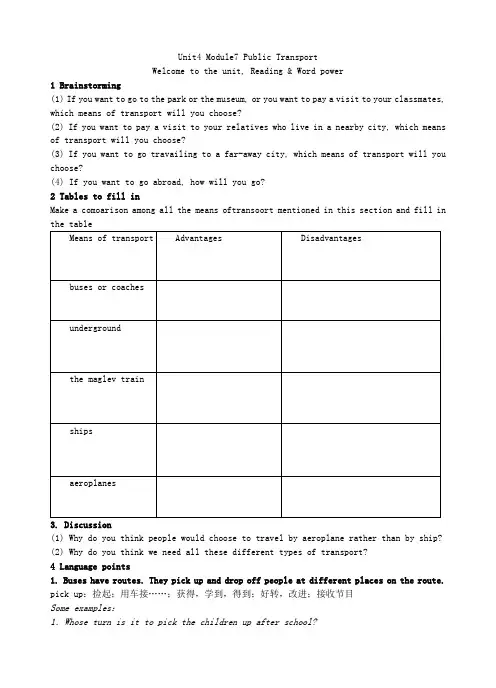
Unit4 Module7 Public TransportWelcome to the unit, Reading & Word power1 Brainstorming(1) If you want to go to the park or the museum, or you want to pay a visit to your classmates, which means of transport will you choose?(2) If you want to pay a visit to your relatives who live in a nearby city, which means of transport will you choose?(3) If you want to go travailing to a far-away city, which means of transport will you choose?(4) If you want to go abroad, how will you go?2 Tables to fill inMake a comoarison among all the means oftransoort mentioned in this section and fill in the table3. Discussion(1) Why do you think people would choose to travel by aeroplane rather than by ship?(2) Why do you think we need all these different types of transport?4 Language points1. Buses have routes. They pick up and drop off people at different places on the route. pick up:捡起;用车接……;获得,学到,得到;好转,改进;接收节目Some examples:1.Whose turn is it to pick the children up after school?2.I picked up the kids' clothes that were lying on the floor.3.My radio can pick up France.4.The nurse had picked up the information from a conversation she overheard.He some Frenth while he was away on a business trip in Paris.(2003上海春) A.made out B.picked up C.gave up D.tookin2.drop of (一个个)散去;走掉;让某人下车;下车We dropped our luggage off at the hotel and went sightseeingThe demand for mobile phones shows no signs of dropping off.引申:drop in 顺便来访drop sb.a line写短信寄给某人drop behind 落后drop out中途放弃Just drop me at the statiOn,please.A.out B.away C.on D.ofr3.The maglev train is powered by magnets.power:verb,给…提供动力,用动力发动Buses and trucks are usually powered by diesel engines.In the future electricity,will be used to power road vehiclesLook at these pictures and discuss the different means of transport and when they became popular.means:n.方法,手段,工具The quickest means of travel is by plane.she could find no means of escape other than jumping out of the window.引申:by means of依靠,凭借by no means决不,by this means通过这种方法自我检测:Every means tired out,but it doesn’t work.A.is B.has been C.are D.have beenThough rich,he was better off than at any other period in his life.A.by any means B.by some means C.by all means D.by no meansHomework1.Finish the part Al and A2 of the work book.2.Prepare the Reading.Reading The first underground in me woridl BrainstormingWhen we talk about London,what will you think about?2.Fast reading for general idea1.When was the first underground system opened?2.Why Was the Victoria Line important?3.What did Charles Holden do?3.Detailed reading for important information(1)Why was an underground system first developed in London?(2)What Was the London Underground like in 1863?(3)What did Charles Yerkes do to improve the underground?(4)What are some of the different things that the underground has functioned as?(5) What happened to the London Underground after World War II?(6) What does it mean when the brochure says that the underground system is user-friendly?3 Matching exerciseRead the text and find the information to match the year.4. Main idea to b, foundGo throughthe passage again and find out how many parts can the passage be divided into.(1). distant adj. far away in the distant past/future: far away in the past or future: distance n. [C or U] the amount of space between two places:He travels quite a distance (= a long way) to work every day.Does she live within walking distance of her parents?高考链接The faces of four famous American presidents on Mount Rushrnore can be seen from a _ _ of 60 miles.(2004全国)A. lengthB. distanceC. wayD. space(2).choke n.[C]v.窒息;堵塞;阻塞1). The child swallowed a pen and chocked to death.2). The roads to the coast were choked with traffic.3). At lunchtime the streets were choked with traffic.4). Children can choke on peanuts.引申:chock back忍住,抑制chock up因激动等说不出话来自我检测During the rush hours the roads are usually _ _ up with traffic.A. chockedB. crowdedC. blockedD. checked(3). link v. [T] to make a connection between two or more people, things or ideas: 1.The explosions are not thought to be linked in any way.link up: to form a connection, especially in order to work or operate together:2.The organization's aim is to link up people from all over the country who are suffering from the disease.3. They linked up two areas by telephone.用法拓展:be connected with与……相接,和……有联系(4). honor a quality that combines respect, pride and honesty:a man of honor We fought for the honor of our country.n. [C] a reward, prize or title that publicly expresses admiration or respect: She received an honor for her services to the community.in honor of sb./sth: in order to celebrate or show great respect for someone or sth.: a banquet in honor of the president高考链接My sister was against my suggestion while my brother was it. (2006陕西)A. in favor ofB. in memory ofC. in honour ofD. in search of(5). permit v. -tt- [T] to allow sth.: The regulations do notpermit much flexibility.[+ ing form of verb] The prison authorities permit visiting only once a month.[+ object + to infinitive] The security system will not permit you to enterwithout the correct password(6).order n.[U]顺序in order of以……的顺序out oforder:杂乱无序The children lined up in order of age/height.I can't find the file I need because they're all out of order(= they are no longer arranged in the correct way).Put the files in alphabetical order.高考链接You have been sitting on my hat and now it is badly out of .(2006广东)A. dateB. shapeC. orderD. balance(7). refer to phrasal verb:1) to talk or write about someone or sth., especially briefly提到,谈到In her autobiography she occasionally refers to her unhappy schooldays.2) If writing or information refers to someone or sth., it relates to that person or thing:涉及到,与某人或某事相关The new salary scale only refers to company managers and directors(8). discount n. [C] a reduction in the usual price折扣at a discount:打折They usually give you a discount if you buy multiple copies.They offer a 10 percent discount on rail travel for students.自我检测They sell the sweater a discount of 30 percent.A. onB. forC. atD. with6 Consolidation exercisesThe London underground system has the (1) of being the oldest and most complex underground system in the world. Before 1850, train services to London had already been (2) ,but people couldn' t build railways into the city because doing that would cause great (3) to many historic buildings.So many buses were needed to (4) people to the city centre, which, however, often (5) traffic. This problem led to the development of the underground system.In 1854, Metropolitan Railway Company was allowed to build an underground railway and the first, tunnels were opened in 1863. In 1868, the next (6) of the underground system was opened by another company called the Metropolitan District RailwayIn 1884, these two companies (7) and provided the underground service in the middle of the city.With the development of the (8) ways of digging tunnels, the first railway tunnel under the River Thames was dug in 1884, and over the next 25 years, six (9) deep underground lines were made. But because they were (10) owned and far away from each other, traveling on these lines was (11) Having seen the situation, Charles Yerkes, tried to improve the system. He bought many of the different lines and setting up the Underground Group. In 1933, a public (12) called the London Passenger Transport Board was created, which eventually became London Transport. From 1918 to 1938, the system (13) a lot.During World War II, the underground system had some (14) usesFor example, many underground stations once (15) as bomb shelters. After the war, more lines were added. Now, the network of the underground system includes 12 lines and goes 26 miles out of central London. Three million people travel on the underground every day. Can you imagine what London would be if there were no such underground system?7Homework(1)Prepare the part Word power(2)Read the passage on Page 130 of the workbookWord powerLanguage points1.depend on/upon 依靠,依赖1). Charities depend on people supporting their activities.2). The country depends heavily on foreign aid.3). Elaine depends upon Bob completely for her happiness.高考链接(1)――How oRen do you eat out?…——,but usually once a week.(2004天津)A.Have no idea B.It depends C.As usual D.Generally speaking(2)一Could you do me a favour?…It depends on——it is.(2006北京)A.which B.whichever C.what D.whatever2.rely on sb/sth.1)依靠,依赖[+ing form of verb]The success of this project relies on everyone making an effort.[+ to infinitive] I'm relying on the garage to fix the car by tomorrow.2) to trust someone or sth. or to expect them to behave in a particularway 指望,期待British weather can never be relied on - it's always changing.[+ ing form of verb] Don't rely on finding me here when you get back (= I might have gone).3. means: a method or way of doing sth.:方法,手段1). They had no means of communication.2). We need to find some other means of transportation.3). We must use every means at our disposal. She tried to explain by means of sign language. 引申:by means of借助某种手段,方法by all means无论如何by no means 决不4. end v. [I or T] to finish or stop, or to make sth. finish or stop结束,终止When is your meeting due to end? Her resignation ends months of speculation about her future.Their marriage ended in 1991.end...with..:以……方式结束I'd like to end with a song from my first album.She ended her speech with an humorous joke.Grammar and usageTeaching aims: learn the verb-ing and verb-ed used as an attribute or as an adverbial .Important and difficult points: the verb-ing and verb-ed used as an attribute or as an adverbial.Period oneStep 1.Ask Ss to read Parts1 and 2.Step 2. Practice (Deal with Part A ).Step 3. Go through Parts 3, 4 and 5.Step 4. Deal with Part B.Step 5. Exs (C1 and C2 of Page 128 in Workbook).Step 6. Homework: Go through the paper and finish off the exercises of it.(15m)Period TwoStep1.分词作定语。
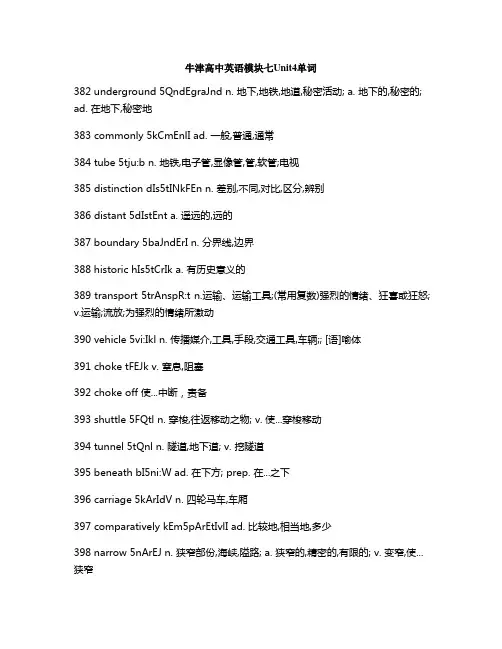
牛津高中英语模块七Unit4单词382 underground 5QndEgraJnd n. 地下,地铁,地道,秘密活动; a. 地下的,秘密的; ad. 在地下,秘密地383 commonly 5kCmEnlI ad. 一般,普通,通常384 tube 5tju:b n. 地铁,电子管,显像管,管,软管;电视385 distinction dIs5tINkFEn n. 差别,不同,对比,区分,辨别386 distant 5dIstEnt a. 遥远的,远的387 boundary 5baJndErI n. 分界线,边界388 historic hIs5tCrIk a. 有历史意义的389 transport 5trAnspR:t n.运输、运输工具;(常用复数)强烈的情绪、狂喜或狂怒; v.运输;流放;为强烈的情绪所激动390 vehicle 5vi:Ikl n. 传播媒介,工具,手段,交通工具,车辆;; [语]喻体391 choke tFEJk v. 窒息,阻塞392 choke off 使...中断,责备393 shuttle 5FQtl n. 穿梭,往返移动之物; v. 使...穿梭移动394 tunnel 5tQnl n. 隧道,地下道; v. 挖隧道395 beneath bI5ni:W ad. 在下方; prep. 在...之下396 carriage 5kArIdV n. 四轮马车,车厢397 comparatively kEm5pArEtIvlI ad. 比较地,相当地,多少398 narrow 5nArEJ n. 狭窄部份,海峡,隘路; a. 狭窄的,精密的,有限的; v. 变窄,使...狭窄399 steam engine n. 蒸汽机400 section 5sekFn n. 部分,章节,部门,路段; 断面,剖面,截面; v. 划分 [同]divide 401 district 5dIstrIkt n. 区,地区,行政区; v. 区,区域,地区402 link up 连接;联系403 middle 5mIdl a. 中等的,中间的; n. 中间404 in the middle of 在...中间405 advanced Ed5vB:nst a. 高级的,先进的406 accelerate Ak5selEreIt v. 加速407 pace 5peIsI n. 速度,步调,步法; v. 踱步,缓慢的走,引导408 inconvenient 9InkEn5vi:njEnt a. 不方便的409 separately 5sepErItlI ad. 分别地(各别地,独立地,借助外力地)410 acquisition 9AkwI5zIFEn n. 获得,所获之物411 board bR:d n. 木板,甲板,董事会; vi. 登(飞机、车、船等)412 authority C:5WRrItI n. 权力,权威,当局413 expansion Iks5pAnFEn n. 扩大,膨胀414 connection kE5nekFn n. 联系,关系,连接415 architect 5B:kItekt n. 建筑师416 function 5fQNkFEn n. 功能,函数,重大聚会; vi. 运行,起作用417 anti-aircraft n.高射兵器418 minister 5mInIstE(r) n. 部长,大臣; v. 伺候; vi. 照顾,给予帮助419 prime minister 首相420 administration EdmInIs5treIFEn n. 行政,管理,中央政府421 user-friendly 用户友好的; a. 容易操作的,好用的422 anniversary 9AnI5v\:sErI n. 周年纪念(日)423 crown kraJn n. 王冠,王权,顶点; v. 使...成王,加冕,居...之顶424 effectively I5fektIvlI ad. 有效地425 network netw\:k n. 网络; vt. 联络,交流426 permit 5p\:mIt n. 许可证,执照; v. 允许,许可427 sightseeing 5saItsi:IN n. 观光,游览428 horrible 5hCrEbl a. 可怕的,令人毛骨悚然的,令人讨厌的429 damp dAmp n. 湿气; a. 潮湿的430 dozen 5dQzn n. (一)打,十二个431 union 5ju:nIEn n. 联盟,结合,工会432 discount dIs5kaJnt n. 折扣,贴现率; v. 打折扣,贴现433 at a discount 打折扣434 album 5AlbEm n. 集邮本,照相簿,唱片簿435 gas gAs n. 煤气,气体,汽油; vt. 毒(死),加油436 release rI5li:s n. 释放,让渡,发行; v. 释放,让与,准予发表437 official E5fIFl a. 官方的,正式的; n. 官员438 increase 5Inkri:s n. 增加,增强,提高; v. 增加,提高439 in the hope that ... 希望… …440 take notice of 注意到441 cycle 5saIkl n. 循环,周期; v. 骑自行车442 make better use of 更好地利用443 aim eIm n. 目标,对准; v. 对准目标,打算444 confuse kEn5fju:z v. 混乱,狼狈,困惑445 tire 5taIE(r) n. 轮胎; v. 使疲倦,厌烦446 annoy E5nCI v. 使...苦恼,骚扰447 undertake 9QndE5teIk v. 从事,保证448 sacrifice 5sAkrIfaIs n. 牺牲,供俸,祭品; v. 牺牲,祭祀,贱卖449 assignment E5saInmEnt n. 分配,功课,任务,被指定的(课外)作业;(分派的)任务,委派450 beyond bI5jCnd ad. 在更远处; n. 远处; prep. 超出;越过451 modest 5mCdIst a. 谦虚的;适度的;端庄的452 make up for 补偿;弥补453 postpone pE5spEJn v. 延期; vt. 推迟,延期454 coast kEJst n. 海岸,海滨455 harbour 5hB:bE(r) n. 海港; vt 停泊456 airline 5aIElaIn a. (飞机)航线的; n. (飞机的)航线,航空公司457 flash flAF n. 闪光,闪现,一瞬间; v. 闪光,闪现,闪烁; [计算机]Adobe公司的动画技术458 news flash 最后新闻459 speed spi:d n. 速度,迅速,超速; v. 加速,超速,推进460 speed up (使……)加快速度461 timetable 5taImteIbl n. 时间表,时刻表462 departure dI5pB:tFE(r) n. 离开,出发463 wash away 冲掉,冲走464 repair rI5peE(r) n. 修理,补救; v. 修理,补救,补偿465 under repair 正在修理466 May Day n. 国际劳动节467 ferry 5ferI n. 渡船,渡口468 by ferry 乘渡轮,乘渡船469 in addition to 除…之外(还)470 port pR:t n. 港口471 peak pi:k n. 山顶,顶点,帽舌; v. 到达高点,消瘦,竖起472 punctual 5pQNktFJEl a. 严守时刻的,准时的,正点的473 reliable rI5laIEbl a. 可靠的474 arise E5raIz v. 站立,出现475 arise from 由...产生,由...引起476 be aimed at 目的是,旨在,针对477 extreme Iks5tri:m a. 极度的,极端的,尽头的,末端的; n. 极端478 cause kR:z vt.引起; n.原因479 cyclist 5saIklIst n. 骑自行车的人480 pedestrian pI5destrIEn a. 徒步的,缺乏想像的; n. 行人481 lorry 5lCrI n. 卡车482 surrounding sE5raJndIN a. 周围的; n. 环境,周围的事物483 lane leIn n. 小路,小巷,行车道484 signal 5sIgn(E)l n. 信号,导火线,动机; v. 向...作信号485 impatient Im5peIFEnt a. 不耐烦的,急躁的486 jam dVAm n. 果酱,拥塞之物,堵塞; v. 挤,塞满,混杂487 traffic jam n.交通阻塞488 aggressive 5EgresIv a. 侵犯的,攻击性的,有进取心的489 overtake 5EJvE5teIk v. 赶上,突然来袭,压倒490 fine faIn n. 罚款,罚金; a. 美好的,好的,晴朗的,健康的; v. 罚款491 concentration 9kCnsen5treIFEn n. 集中,专心,浓度492 consume kEn5sju:m v. 消耗,消费,饮食;毁灭;消磨;枯萎493 alcoholic 9AlkE5hC:lIk n. 酒鬼,酒精中毒的人; a. 酒精性的494 violate 5vaIEleIt v. 违犯,亵渎,干扰495 couple 5kQpl n. 对,夫妇,数个; v. 加倍,成双,连结496 a couple of 几个497 dismiss dIs5mIs v. 解散,开除498 irresponsible 9IrIs5pCnsEbl a. 不负责任的,不可靠的499 bicycle 5baIsIkl n. 自行车; v. 骑自行车500 chief tFi:f a. 主要的,首席的; n. 首领501 assumption E5sQmpFEn n. 假定,设想502 pavement 5peIvmEnt n. 人行道503 load lEJd n. 负荷,重担,装载量; v. 装载,装填,担负,给(枪)装子弹; [计算机] 装入504 overload 9EJvE5lEJd vt. 使超载505 unsteady 5Qn5stedI a. 不稳定的(易变的); vt 使...不稳定(动摇)506 invitation 9InvI5teIFn n. 邀请507 brake breIk n. 煞车; v. 煞车508 tyre 5taIE(r) n. 轮胎509 incorrectly 9InkE5rektlI ad. 不正确地, 错误地510 crossing 5krCsIN n. 人行横道,十字路口511 orderly 5C:dElI a. 有秩序的,整齐的; ad. 依次地,顺序地; n. 勤务兵。
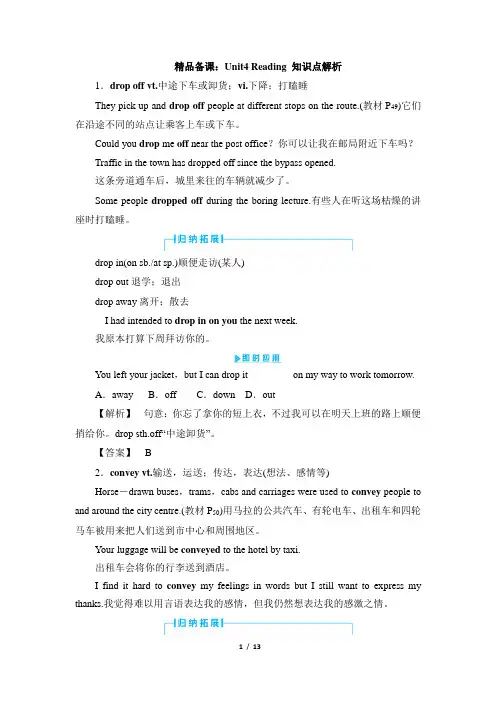
精品备课:Unit4 Reading 知识点解析1.drop off vt.中途下车或卸货;vi.下降;打瞌睡They pick up and drop off people at different stops on the route.(教材P49)它们在沿途不同的站点让乘客上车或下车。
Could you drop me off near the post office?你可以让我在邮局附近下车吗?Traffic in the town has dropped off since the bypass opened.这条旁道通车后,城里来往的车辆就减少了。
Some people dropped off during the boring lecture.有些人在听这场枯燥的讲座时打瞌睡。
drop in(on sb./at sp.)顺便走访(某人)drop out退学;退出drop away离开;散去I had intended to drop in on you the next week.我原本打算下周拜访你的。
You left your jacket,but I can drop it ________ on my way to work tomorrow.A.away B.off C.down D.out【解析】句意:你忘了拿你的短上衣,不过我可以在明天上班的路上顺便捎给你。
drop sth.off“中途卸货”。
【答案】 B2.convey vt.输送,运送;传达,表达(想法、感情等)Horse-drawn buses,trams,cabs and carriages were used to convey people to and around the city centre.(教材P50)用马拉的公共汽车、有轮电车、出租车和四轮马车被用来把人们送到市中心和周围地区。
Your luggage will be conveyed to the hotel by taxi.出租车会将你的行李送到酒店。
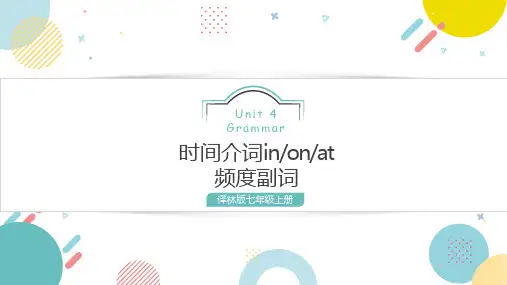
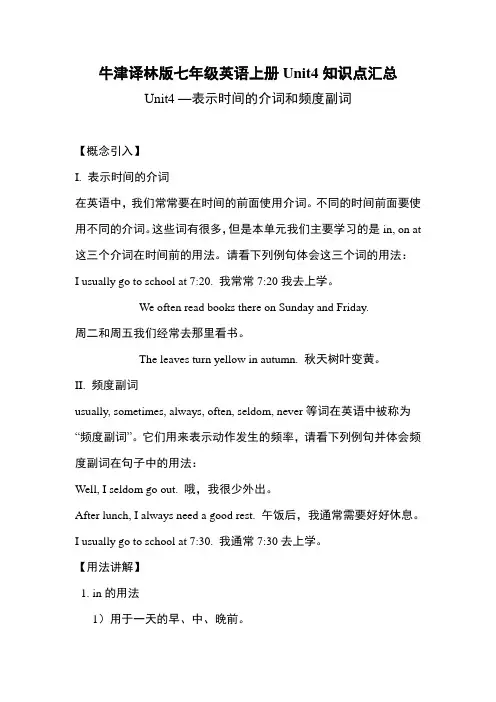
牛津译林版七年级英语上册Unit4知识点汇总Unit4 —表示时间的介词和频度副词【概念引入】I. 表示时间的介词在英语中,我们常常要在时间的前面使用介词。
不同的时间前面要使用不同的介词。
这些词有很多,但是本单元我们主要学习的是in, on at 这三个介词在时间前的用法。
请看下列例句体会这三个词的用法:I usually go to school at 7:20. 我常常7:20我去上学。
We often read books there on Sunday and Friday.周二和周五我们经常去那里看书。
The leaves turn yellow in autumn. 秋天树叶变黄。
II. 频度副词usually, sometimes, always, often, seldom, never等词在英语中被称为“频度副词”。
它们用来表示动作发生的频率,请看下列例句并体会频度副词在句子中的用法:Well, I seldom go out. 哦,我很少外出。
After lunch, I always need a good rest. 午饭后,我通常需要好好休息。
I usually go to school at 7:30. 我通常7:30去上学。
【用法讲解】1. in的用法1)用于一天的早、中、晚前。
例如:We have English class in the morning. 我们早上上英语课。
My mother goes to work in the afternoon. 我妈妈下午去上班。
She watches TV in the evening. 她晚上看电视。
2)用于月份、季节、年份前。
例如:The flowers come out in spring. 花在春天绽放。
The Children’s Day is in May. 儿童节在五月。
They came to China in 1998. 他们在1998年来到了中国。
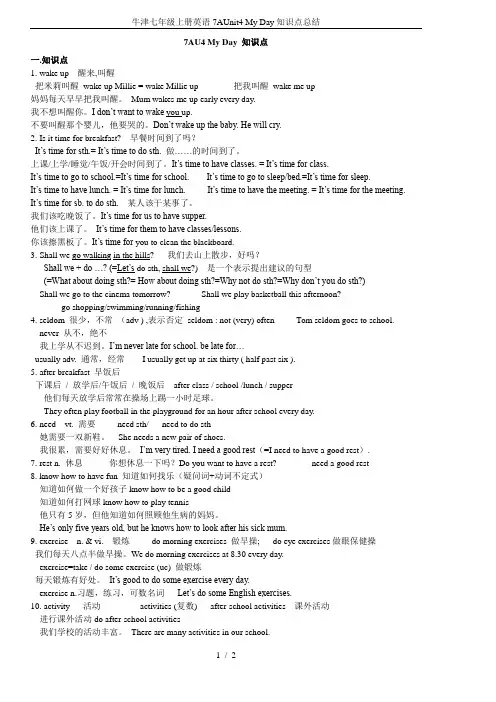
7AU4 My Day 知识点一.知识点1. wake up 醒来,叫醒把米莉叫醒wake up Millie = wake Millie up 把我叫醒wake me up妈妈每天早早把我叫醒。
Mum wakes me up early every day.我不想叫醒你。
I don’t want to wake you up.不要叫醒那个婴儿,他要哭的。
Don’t wake up the baby. He will cry.2. Is it time for breakfast? 早餐时间到了吗?It’s time for sth.= It’s time to do sth.做……的时间到了。
上课/上学/睡觉/午饭/开会时间到了。
It’s time to have classes. = It’s time for class.It’s time to go to school.=It’s time for school.It’s time to go to sleep/bed.=It’s time for sleep.It’s time to have lunch. = It’s time for lunch. It’s time to have the meeting. = It’s time for the meeting. It’s time for sb. to do sth. 某人该干某事了。
我们该吃晚饭了。
It’s time for us to have supper.他们该上课了。
It’s time for them to have classes/lessons.你该擦黑板了。
It’s time for you to clean the blackboard.3. Shall we go walking in the hills? 我们去山上散步,好吗?Shall we + do …? (=Let’s do sth, shall we?) 是一个表示提出建议的句型(=What about doing sth?= How about doing sth?=Why not do sth?=Why don’t you do sth?)Shall we go to the cinema tomorrow? Shall we play basketball this afternoon?go shopping/swimming/running/fishing4. seldom 很少,不常(adv ) ,表示否定seldom : not (very) often Tom seldom goes to school. never 从不,绝不我上学从不迟到。
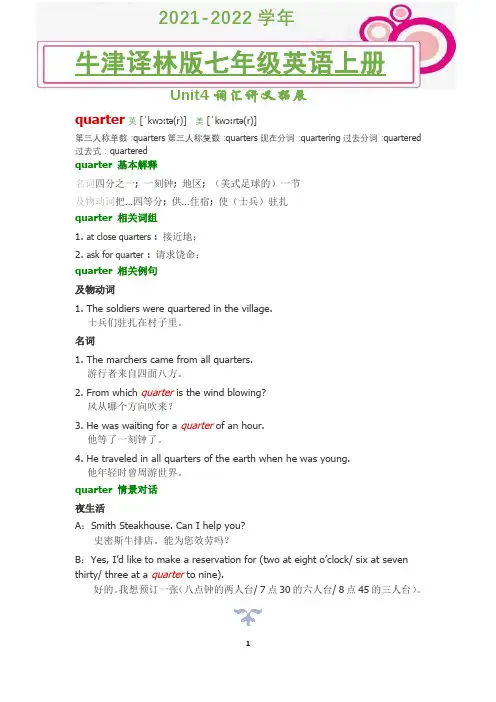
Unit4词汇讲义拓展quarter英[ˈkwɔ:tə(r)]美[ˈkwɔ:rtə(r)]第三人称单数:quarters第三人称复数:quarters现在分词:quartering过去分词:quartered 过去式:quarteredquarter 基本解释名词四分之一; 一刻钟; 地区; (美式足球的)一节及物动词把…四等分; 供…住宿; 使(士兵)驻扎quarter 相关词组1. at close quarters : 接近地;2. ask for quarter : 请求饶命;quarter 相关例句及物动词1. The soldiers were quartered in the village.士兵们驻扎在村子里。
名词1. The marchers came from all quarters.游行者来自四面八方。
2. From which quarter is the wind blowing?风从哪个方向吹来?3. He was waiting for a quarter of an hour.他等了一刻钟了。
4. He traveled in all quarters of the earth when he was young.他年轻时曾周游世界。
quarter 情景对话夜生活A:Smith Steakhouse. Can I help you?史密斯牛排店。
能为您效劳吗?B:Yes, I’d like to make a reservation for (two at eight o’clock/ six at seven thirty/ three at a quarter to nine).好的。
我想预订一张(八点钟的两人台/ 7点30的六人台/ 8点45的三人台)。
Unit4词汇讲义拓展quarter 网络解释1. 夸脱:三骨是港澳地区对英制三夸脱(Quarter)的谐音. 三夸脱即四分之三寸的意思. 对裤长在四分之三部位的中裤称为三骨裤. 其长度约在穿着者膝盖下10厘米~20厘米之间. 这种裤子在港澳地区穿着者较多,八十年代也曾在我国流行.2. 学季:她学习优异,年纪轻轻就获得麻省理科大学(MIT)电子工程硕士学位,一年多前再转至史丹福大学继续攻读博士课程. 周梦瑶曾表示,学季(quarter)制的史丹福大学较学期(semester)制的麻省理工课业轻鬆得多,并已於去年顺利通过博士资格考试.3. 节:比赛分为四节(Quarter) 进行,职业美足及大学美足每一节是15分钟,高中美足则为12分钟. 中场的休息时间通常是15分钟,职业美足目前缩短为12分钟. 每一队上半场及下半场各有三次叫停的机会.quarter 词典解释1. 四分之一A quarter is one of four equal parts of something.e.g. A quarter of the residents are over 55 years old...1/4的居民年龄在55岁以上。

7上Unit4Grammar(时间介词&频度副词)一、表示时间的介词。
时间状语往往由介词短语充当,不同的时间所使用的介词也不相同,最常用的三个介词是at, on, in。
1) at1. 在钟点时间前at six o’clock2. 在一日三餐前at breakfast3. 在无day的节日前at Christmas4. 在具体年龄前at 8 years old2)on1. 在星期名称前on Monday2. 在某月某日前on 15th July3. 在某月某日的早中晚前on the morning of 20124. 在有day的节日前on May Day3)in1. 在一天早中晚前in the evening2. 在月份前in February3. 在年份前in 20184. 在季节前in spring注意:在没有day节日前用at。
如:1. Christmas 圣诞节2. Spring Festival 春节3. Dragon Boat Festival龙舟节4. Mid-autumn Festival 中秋节5. Halloween 万圣节前夜在有day节日前用on。
如:1. New Year’s Day 元旦节2. Children’s Day 儿童节3.May Day 五一节4.Mother’s Day 母亲节5.Father’s Day 父亲节6.Teachers’ Day 教师节7.Thanksgiving Day 感恩节二、频度副词。
Ⅰ.always, usually, often, sometimes, seldom, never等词被称为频度副词,可与一般现在时连用,表示事情发生的频率,它们表示的频率由高到低为:always (总是)usually(通常)often (经常)sometimes(有时)seldom(很少)never(从不)Tips小贴士1.)never 反义词always ; often 反义词seldom2.)never 和seldom表示否定sometimes 、often 、usually 、always表示肯定3.)频度副词还有:every+段时间(day/week/month---etc);次数+段时间:once/twice/three times a year---etc4.)sometimes=at times=from time to time5.) sometimes/some times/sometime/some time的区别:Sometimes有时some times 一些次sometime 某个时候some time 一段时间Ⅱ.how often是对表示频度副词的时间状语的提问,可翻译为“多久(一次)”。
初中英语牛津上海七年级上册Unit4Jobspeopledo知识点及语法点讲解U4 Jobs people do重点词汇1.job和work的区别job是可数名词,指一件具体工作;work是不可数名词,指动脑或动手做事。
He found a part-time job in a XXX.他在餐馆找到了一个临时工作。
Most people have to work in order to live.大部分人必须工作以维持生活。
2.architectn.建筑师Good architects know how to design buildings to fit into the land.好的建筑师知道怎样设计使得建筑物与地形相协调。
【知识拓展】architecturen.建筑风格XXX century十八世纪的建筑风格3.constructionn.建筑This is a fine construction.这是一个完美的建筑(物)。
【固定搭配】under construction在建;(正在)修建中XXX.新铁路尚在建设中。
【知识拓展】constructv.建造;构造XXX.我哥哥喜欢构造飞机模型。
4.type1)v.打字1XXX.他打字打得又快又好。
2)n.品种;型号Men of his type are not to be trusted.像他那样的人不可相信。
【联想】XXX.打字员XXX.打字机5.XXX.(家具的)搬运,搬家He is young but he XXX.他很年青,但他经营一家搬迁公司。
【遐想】XXX.(从原先位置)拿开,移开;脱去XXX.他从桌上移走了桌布。
6.deliverv.分发;递送XXX.那个邮差准时地投递了信件。
【拓展】XXX.投递;传送Your order is ready for delivery.你订购的货物可随时交付。
7.put out燃烧;关掉put out a fire扑灭火灾put out light关掉电灯【短语】1) put away储藏;收拾好We put away the tools before we leave the workshop.我们在离开车间以前把工具收拾好。
U41.wake up 醒来,叫醒(名随代中)wake him up wake Tom up/wake up Tom类似结构:try on put on take off2.It’s time for sth=It’s time to do sth➡It’s time for sb to do sth3.in the hills在山里4.go to sleep入睡(强调睡着)go to bed强调去睡觉这个动作sleep (强调过程)一般用于现在进行时Simon is sleeping,don’t wake him up.5.sleep late睡懒觉stay up late熬夜6.频率副词:never<seldom<often<usually<always be动词/助动词之后;行为动词之前7.go out出去8.need sb/sth需要某人/某物need to do sth需要做某事need sb to do sth需要某人做某事9.以Must 开头的一般疑问句,肯定回答:Yes,...must. 否定回答:No,...needn’t.10.rest ①名词休息have/take a rest休息一下②adj.剩下的The rest of students are in the classroom.11.don’t know how to do sth不知如何做某事特殊疑问词+to do sth12.have fun/have a good/great time doing sth做某事很愉快13.have/eat breakfast/lunch/dinner/supperhave a big dinner吃大餐14.do morning exercises 做早操do eyes exercises做眼保健操do exercise锻炼15.do afterschool activities 做课外活动16.时间表达法:分钟数≤30:分钟数+past+钟点数分钟数>30:60分钟数+to+下一个钟点数8:15 a quarter past eight/fifteen past eight/eight fifteen8:45 a quarter to nine/fifteen to nine/eight fortyfive17.write to sb写信给某人18.a day at school在学校的一天19.at eight in the morning在早上8点钟20.from Monday to Friday从周一到周五21.on+星期几/星期几的某个时刻On Monday On Friday afternoonon every Monday=on Mondays在每周一22.first ①adv. 作状语②adj. 第一的the first第一at first首先for the first time第一次sb's first time某人的第一次first of all首先23.be nice / friendly to sb对某人好/友好24.chat with each other互相聊天25.in the playground在操场上(有围栏)26.practise ①vt.练习practise doing sth练习做某事②➡n. practice27.best wishes(to sb)wish sb sth. ➡wish sb good luck27.life ①不可数名词“生活”②可数名词“生命”复数:lives28.have (a great)fun29.luck(不可数名词)➡lucky(adj.幸运的)➡luckily(adv.幸运地)反:unlucky 反:unluckilygood luck好运bad luck 倒霉good luck with sth 祝某事顺利good luck to sb祝某人好运30.对频率提问:how often对时长提问:how long过...多久;how soon31.twice a month一月两次32.go for/on a picnic去野餐have a picnic野餐33.【交叉翻译】a car in the park停在公园里的一辆车 a nurse at work 在工作的护士34.dislike ①n. What’s your dislike?②vt. dislike doing sth讨厌做某事dislike sb doing sth讨厌某人做某事35.be good for...对..有好处be bad for...对..有坏处be good to sb对某人好=be nice to sb36.be/get ready for sth为某事做好准备get sth ready for sb.为某人准备好某物get ready to do sth准备好做某事be ready to do sth ①准备好做某事②乐意做某事37.learn a lot about the world学到许多有关世界(的知识)learn to do sth学习做某事learn from sb向某人学习learn from each other互相学习38.in the world(在)世界上a map of the world世界地图all over the world=around the world全世界39.39.on Children’s Day在儿童节40.at Christmas在圣诞节41.时间介词in,on,at的用法42.频率副词:never<seldom<sometimes<often<usually<always 用法:be动词,情态动词,助动词之后;行为动词之前提问:How often43.go home➡go to one’s home walk home➡walk to one’s home 地点副词(home,here,there)前不能直接加介词44.take time to exercise花时间锻炼45.open/close 开/关(门,窗,盒子等)turn on/off 开/关(电器类名词)be tired疲倦,累feel tired感到累一、单项选择( )21. Every morning his mother_______ at sixA. wake him upB. wakes he upC. wakes up himD. wakes him up( )22. We students should not watch_______ TV or_______ films on weekdays.A. too much; too muchB. too many; too manyC. too much; too manyD. too many; too much( )23. It's 12:00 now. It's time_______ lunch.A. to haveB. hasC. forD. A& C( )24.Tom_______ a dog. _______ name is Eddie.A. has, ItsB. have; It'sC. has; It'sD. have; Its( )25. Eddie is Hobo's master. He knows how to_______ Hobo.A. look atB. look forC. look overD. look after( )26. He enjoys_______ with his friends and_______ ice creams with them.A. chating; eatingB. chatting; eatingC. chatting; eatingD. chating; eatting ( )27. Chinese and History are my_______ lessons. I like them_______.A. favourite, bestB. favourites, bestC. favourites, the bestD. the best, favourite ( )28. They always do_______ activities_______.A. afterschool; after schoolB. afterschool; afterschoolC. after school; after schoolD. after school; afterschool( ) 29. We always do some reading_______ every morning.A. onB. inC. /D. for( )30. Look, that's Mike, your classmate. Yes: Let's go and say hello to_______.A. himB. heC. herD. hers( )31. _______ does he go to fly kites? _______ a month.A. How long; One timeB. How soon; OnceC. How often; Once timeD. How often; Once ( )32. Amy studies very hard. She usually_______ at 10. 00 p. m. .A. plays volleyballB. gets upC. goes shoppingD. goes to bed( )33. Kitty goes to the Reading Club twice a week. She is very good at_______ books.A. readB. readsC. readingD. to read( )34. We'll have_______ fun in English this term.A. a lotB. lots ofC. a lots ofD. many( )35. Your brother speaks English very well.Yes, so he does. He practices _______ English every day.A. speakingB. speakC. speaksD. to speak( )36. Mum wants to make a cake. She needs_______ some eggs.A. buyB. buysC. to buyD. buying( )37. How often does the girl eat fish? _______.A. TwiceB. A dayC. OftenD. Two hours( )38. Do you usually_______ the bus to work every day? No, _______ I go there by car.A. take; sometimesB. by; sometimesC. by; sometimeD. take; sometime ( )39. I want_______ the classroom. Would you like_______ me , please?A. clean; helpB. to clean; helpC. clean; to helpD. to clean; to help ( )40. I read the newspaper_______ breakfast.A. asB. forC. atD. in【答案】21~25 DCDAD 26~30 CAACA 31~35 DDCBA 36~40 CCADC二、句型转换1. The boy with a special mask is my brother.(对画线部分提问)________ ________ is your brother?2. The girl is wearing a white blouse.(改为同义句)The girl ________ ________ a white blouse.3. The girl usually has milk and cakes for breakfast.(对画线部分提问)________ does the girl usually ________ for breakfast?4. You look so cool in the pair of jeans.(改为同义句)The pair of jeans ________ so cool ________ you.5. Millie seldom eats fish.(对画线部分提问)________ ________ does Millie eat fish?【答案】Which boy; is in; What have; looks on; How often三、用所给单词的适当形式填空81.I would like_______(play) puter games.82. What about_______ (go) on a picnic next Sunday?83. We read English at 8:00 a.m. Then our first lesson_______ (begin) at 8: 25 a.m.84. English is very_______ (interest). I like it very much.85. It's our_______(one) English lesson. I think I will be interested in it.86. As a famous dancer, she needs ___________ (dance) for two hours every day87. He doesn’t have much time ___________ (listen) to music from Monday to Friday88. How long does it take you ___________ (play) volleyball every Tuesday afternoon?89. You should practise ___________ (speak) English every day.90 Sometimes I spend my free time_________(chat) with my online friends.【答案】81. to play 82. going 83. begins 84. interesting 85. first86. to dance 87. to listen 88. to play 89. speaking 90. chatting四、根据汉语提示、首字母提示和句意,写出合适的单词7l .We_______(练习)speaking English every day.72.He goes to the English Club_______(两次)a week.73.I like this_______(活动).Do you want to join us?74.Please give my best_______(祝愿)to your grandparents.75. What's the time now? It's a_______(一刻钟)past eight.76. Every morning I do morning e_______ at 7:00 at home.77. After school, the teachers often give us some h_______ to do.78. I am very tired. Can I have a r_______?79. I read newspapers every day. I think we can I _______ a lot from that80. They can help us get r for the day.【答案】71. practise 72. twice 73. activity 74. wishes 75. quarter76. exercises 77. homework 78. rest 79. learn 80. ready五、完形填空I’m a middle school student. My __41 _ is big and nice. There are six__42__ in our grade. I’m in Class One. Our English teacher is Miss Wang. There are __43__ students in our class, twentyone girls and twentyfive boys. __44__ of the girls is English. Her __45__ is Lily.It’s four o’clock in the __46__. Some boys are playing football. Boys love __47__football. Some of them are really good at it.__48__ are the girls? They are in the classroom. Miss Wang is in the __49__, too. She wants to teach them to __50__ an English song.( ) 41. A. school B. home C. club D. factory( ) 42. A. students B. boys C. classes D. classrooms( ) 43. A. forty B. fortytwo C. fortysix D. no( ) 44. A. None B. One C. Some D. Many( ) 45. A. work B. bag C. hobby D. name( ) 46. A. morning B. afternoon C. night D. evening( ) 47. A. flying B. borrowing C. playing D. scoring( ) 48. A. What B. How C. Who D. Where( ) 49. A. office B. team C. classroom D. playground( ) 50. A. read B. write C. sing D. have【答案】41~45. ACCBD 46~50. BCDCC六、阅读理解( C )Do you know about Big Ben? Now Let me tell you about it.Big Ben is not the name of a man. It is the name of a huge clock in London. London is the capital of the UK. This clock has four faces, so nomatter (无论) where you stand, you can read the time on the face of Big Ben. Each face is the size of a doubledecker(双层的) bus. The hands are about four metres long. It is about the size of two people standing on top of each other. If you go to London, you may want to visit the House of Parliament(国会大厦). That is where you will find Big Ben sitting at the top of the clock tower(塔) in the House of Parliament. You will hear it as well as see it. The big clock makes such a loud sound, "Ding Dong, Ding Dong," when it goes every quarter(四分之一) of an hour. The clock was named after a big man. He was Sir Benjamin Hill. He did much building work in London many years ago.()61. Big Ben is _______.A. a doubledecker busB. a huge clockC. the name of BenD. a building( )62. The clock strikes(敲响) every _______ of an hour.A. ten minutesB. fifteen minutesC. thirty minutesD. fortyfive minutes()63. Which of the two words mean the same as "large"?A. doubleB. loudC. hugeD. small()64. You can read the time of Big Ben _______.A. at the top of the towerB. in the House of ParliamentC. on the hands of the huge clockD. on the four faces of the clock( )65. The title (标题) of the passage may be _______.A. Big BenB. A clockC. Sir Benjamin HillD. The Capital of the UK( D )It is Sunday today. It is a fine day. We don’t have any classes. We get up early and don’t have a big breakfast, only coffee, bread and butter. Now we are in the park. There are a lot of people in it.First we go boating on the lake. Then we sit under the tree and have our picnic lunch. Some boys swim in the lake and others fly kites. Peter is very good at flying kites, and he is flying a very nice one with Mike over there. Sam and Bill like swimming. They are now swimming in the lake. How well they are swimming !What are Lily and Lucy doing? Look, they are talking with some Chinese students. They are learning to speak Chinese. Miss Wang is helping them. Simon and Millie are sitting under a tree. They are looking after the clothes for the swimmers. ( ) 66. Where are Sam and Bill?A. They are under a big tree.B. They are talking to their English friends.C. They are playing in the park.D. They are swimming in the lake.( ) 67. What are Lily and Lucy doing?A. They are having an English lesson.B. They are talking in Chinese.C. They are talking with Miss Green.D. They are singing English songs.( ) 68. What is under the tree near the lake?A. A dictionary.B. The children’s clothes.C. A chair and a desk.D. Some food and drinks.( ) 69. Which of the following is NOT right?A. It’s a fine day.B. Some Chinese students are talking to Lily and Lucy.C. There are no girls in Sam’s class.D. Children can swim in the lake of the park.( ) 70. Which of the following is right?A. No girls are in the park.B. No one is swimming in the parkC. It is Sunday today.D. Miss Wang is not in the park.【答案】6165 BBCDA 6670 DBBCC。
模块七U4重要词汇(单词+词组)(下)词汇-1. turn up 出现,调高(音量等);发现 【例句研读】翻译下列句子11) Several ministers turned up at the press conference. (2) T urn up the radio so that everyone can hear it.(3) The authorities in Malaysia have turned up some information about Malaysia Airlines MH370 Flight incident.1 .出现;2 .把收音机调大声点;3 .发现了一些信息【归纳拓展】【即时巩固】1. Nowadays, colder air arrives with pollution of haze. I really don't want the children (带出来)in such bad weather.to be taken out2. The silence of the library was broken only by the sound of pages.(翻) being turned overturn around转身 turn against turn down 拒绝,调低 turn offturn out 关掉,熄灭,证明turn toturn a deaf ear to _________ _________ X ^..不理会 turn over____________ 背叛 ______________ 关掉 求助于,翻到翻身,翻转,打翻词汇-2. detail n.具体情况,详情,细节v.详述,详细说明【例句研读】理解句中detail的含义(1)Draw an outline before you 削in the details.(2)The report details the task we will undertake.(3)The man detailed all the wonders happening on the platform to us .1.填充细节;2.报告详述了我们将负担的使命;3.详述了所有的奇事【单词积累】detailed adj.详细的【固定搭配】detail sth to sb 向某人详述某事go into detail(s) 详细叙述,逐一说明in detail 详细地【即时巩固】1. Care of the soul is a gradual process in which even( 生活中的/J、细节) should be considered. The small details of life词汇-3. put through 给…接通(电话), 使…经受 【例句研读】翻译句中put through 的含义(1) Could you put me through to the enquiry department?(2)The ownership of the company changed after it had been put through the reform.【即时巩固】1. If she is not in, can you(把我的电话接通至U ) her secretary? put me through to2. New employees(要经过)a course of training. are put through词汇-4. fill in 填写(表格等),打发(时间) 【例句研读】翻译句中fill in 的含义(1) Fill in your name and address here, please.(2) 2) The policeman filled out a report of the accident. (3) I want you to fill in this form according to my instructions. (4)Fill my cab up !1 .请在这里填写你的姓名和地址;1.接通咨询部门的电话;【归纳拓展】put off __________________建立,竖起,投宿put down __________________储存,关押put on ___________________ 2.经历的改革推迟,拖延,使反感放下,镇压,取缔,记下穿上,增加,假装put up 举起,put away 收起来,put forward 提出2.填写一份事故报告3.填写表格;4.给我的出租车加满油【归纳拓展】fill out ______________ 填写(表格等)fill up 填满,装满,充满【即时巩固】1.Some people find it difficult to( 填写表格). fill in a form2.How are you going to(消磨这个下午)?fill in this afternoon词汇-5. split up分解,分手,使断绝关系;把…分成小组【例句研读】翻译句中split up的含义(11)Please don't split up when the bus drops us off.(12)The young couple split up after a bitter quarrel.(13)Children, you must split up into two groups for this game.(14)The teacher split the class up into six groups.1.不要散开;2.那一对年轻夫妻大吵一场就离婚了;3.分成两组;4.把全班学生分为六个小组【即时巩固】1.The next morning they cooked breakfast, drank coffee and whiskey, and then_________________________ (分手). split up词汇-6. arise v.出现,产生,起因于(from)【例句研读】翻译句中arise的含义(1) A handful of problem may arise, because the timetable is changed.(2) A number of high buildings have arisen where there was nothing a year ago but ruins.(3)Great inventions arise from the inspiration of daily life.1.出现少量问题;2.许多高楼已经拔地而起;3.伟大的发明源于生活中的灵感;【即时巩固】1.Mistakes often(源于)misunderstanding. Arise from词汇-7. aggressive adj.好斗的,气势汹汹的,志在必得的,侵略的,富有攻击性的【例句研读】翻译句中aggressive含义(1)The man had a red face and an aggressive manner.(2)The aggressive young man undertook that he would increase sales.(3)This country has an aggressive foreign policy.(4)This patient is mentally disordered and sometimes can be aggressive.1.咄咄逼人;2.这个有闯劲的年轻人;3.一种侵略性的外交策略;4.攻击性【即时巩固】1. A successful businessman(要有I^劲). has to be aggressive2.Jim s voice(变得凶了起来). becomes/ become aggressive词汇-8. result in导致【例句研读】理解下列句中result in的含义11) The prime architect's departure resulted in the company's crash. (2) His breaking the rules resulted in his being fined.1.那位首席建筑师的离开导致了那家公司的倒闭;2.导致他被惩罚;【归纳拓展】result from 因..而产生(后接原因)as a result of 由于...的结果(后接结果的原因)without result 毫无结果in result 结果【即时巩固】partner likes to cooperate with her.词汇-9. risk v.冒…的危险n.危险,风险【例句研读】理解下列句中risk 的含义(1) I 'll risk the punishment.(2) They were split up into groups and risked approaching the enemy.(3) Experts have been warning for some time of the health risks caused by passive smoking. (4)Patients should be made aware of the risks involved with this treatment.1 .我明知会受处罚也要做;2 .冒险向敌人靠近;3 .健康威胁;4 .了解这些风险 学法点拨:risk 用作动词时,后面接名词或动名词作宾语,不能接动词不定式【归纳拓展】at risk 处境危险,遭受危险 at the risk of 冒...的风险at one's own risk 自担风险face/ tun/ take the risk of 冒..的风险reduce/ lessen the risk of 减少..的风险【即时巩固】1. If your car isn't insured, you may (冒失去——切的风险 )when it crashes into something solid.risk losing everything词汇-10. even if (=even though) 尽管,即使,纵然 【例句研读】理解下列句中even if 的含义(1) He is so busy. He cannot afford enough time with his son even if he wants to.1. She's always very punctual for appointment.__________________________ (结果),her businessAs a result(2)Even if we fail, we 'll risk it.1.即使,尽管;2.即使我们会失败,我们也要冒险一试【归纳拓展】as if / as though 意为“仿佛,似乎,就像…似的",用来引导方式状语从句何表语从句,as if/ as though引导方式状语从句时,从句可用虚拟语气,但as if/ as though从句放在动词look, seem, taste, smell等后面时,从句也可以不用虚拟语气词汇-11. load v.装载,装上,承载n.负荷,负载,大量,许多【例句研读】理解下列句中load的含义(1)The plane was carrying a full load of fuel when it crashed.(2)I don't want to 10ad you with my problems.(3)The truck was carrying a 10ad of sand.(4)He saved 10ads of people.⑸ The minibus is loaded with 20 passengers.1.载满;2.我不希望我的问题给你带来麻烦;3.一车沙;4.他救过很多人;5.载着【归纳拓展】loads of / a load of money/ people 很多钱/ 人be loaded with 装有,载有【即时巩固】1. Two bags which should have gone to Nanjing were at this moment(装载) abroad a flight to Changsha.词汇-12. be up to sb 是某人的职责(或责任),由某人决定【例句研读】理解下列句中划线部分的含义11) It's not up to you to tell me how to do my job.22) --Shall we eat out or stay in?--It's up to you.1.还轮不到你;2.你决定吧【归纳拓展】up to有很多意思,(1)达到(数量、程度等);(2)直到,不多于;不迟于;(3)与…一样高(或好);(5)正在干,从事着(尤指坏事);在捣鬼(4)(体力或智力)能胜任;2.(至ij 目前为止 ),the program has saved thousands of children who would otherwise have died.1. It's up to you;2. 2. Up to now;1. The temperature went up to 35 C .2. Up to now he's been very quiet.3. Her new book isn 't up to her usual standard.4. I don't feel up to going to work today.5. What have you been up to ?6. I'm sure he's up to no good.【即时巩固】1.(由你)to make the choice. __________________________ 上升___________________________ 到目前为止没有达到她的正常水平我觉得不舒服,今天不能去上班你一直在搞什么名堂我敢说他在打什么坏主意。
7A Unit 4 知识点整理1.have breakfast/lunch/dinner吃早饭/午饭/晚饭have+一日三餐(中间无冠词)have a big breakfast/lunch/dinner 吃一顿丰盛的早饭/午饭/晚饭have a+形容词+一日三餐(中间有冠词)2.do morning exercises做早操exercise(n.)可数:成套的运动do eye exercises 做眼保健操do exercise 做锻炼exercise(n.)不可数:锻炼do some/much/more exerciseDoing morning exercises is good for us.(动名词短语作主语,谓语动词用单数)3.have lessons上课I should have lessons from Monday to Friday.4.wake up醒来wake sb. up 叫醒某人My father asks me to wake him up at 10 a.m..(代词him放中间) 5.do afterschool activities进行课外活动afterschool(adj.) 课外的,课后的after school(介词短语)放学后Students do all kinds of afterschool activities.Students do all kinds of activities after school.6.do one’s/sb’s homework做作业One’s/sb’s:my/your/his/her/our/your/their肯定句:She often does her homework in time.疑问句:Does she do her homework in time?否定句:She doesn’t do her homework in time.7.go to bed去睡觉Young people often go to bed late.8.be late for迟到Don’t be late for school tomorrow.(Don’t do sth.祈使句否定) 9.at a quarter past eight 在8:15(past几点过了几分)at 8:30/at 6 years old/at Christmas/at noon/at night/at lunch (at+时刻/年龄/不以Day结尾的节日/固定搭配)10.It is time for sth.=It is time to do sth.到了做...的时间It is time for dinner.=It is time to have dinner.It is time for sb. to do sth. 对于某人来说到了做...的时间It is time for us to do more exercise.11.Shall we do sth.? 让我们做...可以吗?Let’s do sth., shall we? 让我们做...可以吗?What/How about doing sth.? 做...怎么样?提出建议Why not do sth.? 为什么不做...呢?Why don’t you do sth.? 为什么不做...呢?12.go walking去散步go running/swimming/shopping/fishing: go+Ving去做某事13.go out出去Eddie is lazy, so he seldom goes out.14.need a good rest=need to have a good rest需要好好休息need sth./need to do sth. 需要.../需要做......After doing some afterschool activities, I need a good rest.After doing some afterschool activities, I need to have a good rest.15.how to have fun如何玩乐(特殊疑问词+to do sth.)Some dogs just don’t know how to have fun.16.have (lots of/great) funhave a good/great/wonderful time 玩得开心enjoy oneself(myself/yourself/himself/herself/...)have fun doing=have a good time doing做...很开心They have fun watching basketball matches on TV.They have a good time watching basketball matches on TV.17.start/begin to do sth. 开始做某事We start/begin to have lessons at eight in the morning.18.from Monday to Friday 从周一到周五19.do morning exercises first 先做早操20.my favourite subject 我最喜爱的科目21.chat with each other(chatchatting) 彼此聊天Girls enjoy chatting with each other after class.22.in the morning/afternoon/evening 在早上/下午/晚上in the morning/in 2022/ in October/in autumn(in+一天的早中晚/年份/月份/季节)23.have a Reading Club 有一个阅读俱乐部24.on Thursday afternoon 在周四下午on Sunday/on October 1/ on the morning of October 1/ on a cold winter morning/on Children’s Day(on+星期/日期/具体某一天的早中晚/以Day结尾的节日)25.be in the school volleyball team 在学校的排球队=be a member of the school volleyball teamSimon is in the school volleyball team.=Simon is a member of the school volleyball team.26.practise doing sth. 练习做某事Millie and Sandy like practising playing volleyball after school.27.have much time to do sth. 有许多时间做某事have time to do sth. 有时间做某事have enough time to do sth. 有足够的时间做某事have little time to do sth. 几乎没有时间做某事have no time to do sth. 没有时间做某事28.go to her dancing lessons 去上舞蹈课29.dance for half an hour 跳舞半小时(for+一段时间)30.go roller skating 去溜旱冰31.Wish our team good luck. 祝我们的队好运。
Unit4词汇讲义拓展wake英 [weɪk]美 [wek]第三人称单数:wakes现在分词:waking过去分词:woken过去式:woke wake 基本解释不及物动词醒,醒来; 苏醒,复活; 警觉; 弄醒,叫醒及物动词激发,唤醒; 使意识到,使警觉; 为…守夜名词守灵,守夜; (船航过时的)尾波; 年度假期名词backwashwake 反义词及物动词sleepwake 相关词组1. in the wake of : 尾随, 紧跟, 仿效;wake 相关例句及物动词1. Please wake me up at 7:00.请于七点钟叫醒我。
不及物动词1. Nature wakes in spring.春回大地,万物复苏。
2. A light wind woke among the trees.微风从林间掠过。
3. I woke up at six this morning.今天早晨我六点钟醒来。
4. He usually wakes early.他平常醒得很早。
wake 情景对话Turning in-(上床睡觉)A:I guess I'll turn in, Bob. It's been a long day.我想我要上床了,鲍勃。
今天很累了。
Unit4词汇讲义拓展B:I've got a chapter to read for tomorrow, so I'll be up for a while yet.I'll turn off thd heat and lock thd door before I go to bed.我还有一章要读完,这是明天的功课,所以我要等一会儿再睡。
在我上床以前我会关掉暖气和锁上门的。
A:Okay. What time are you getting up tomorrow?好的。
明天你几点起床?B:Oh, the usual time. No, wait a minute.Make sure I'm up before you go to work, will you? I've got a quiz at ten. It wouldn't hurt to read over my notes.啊,老样子。